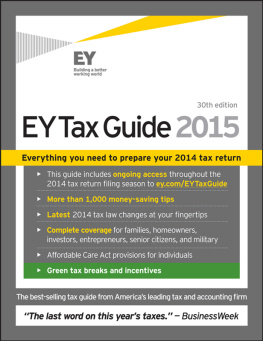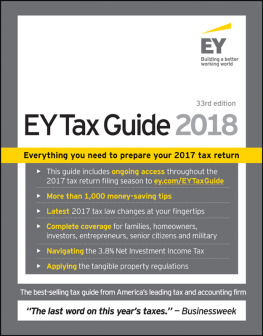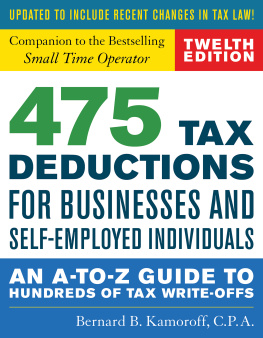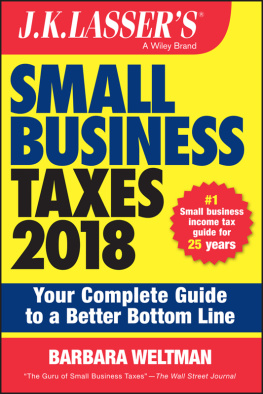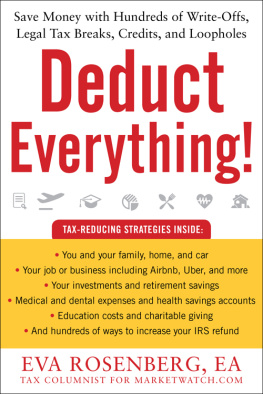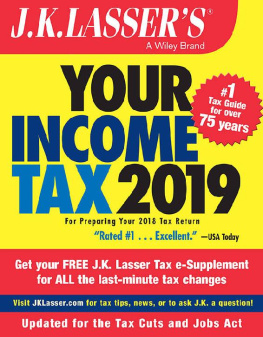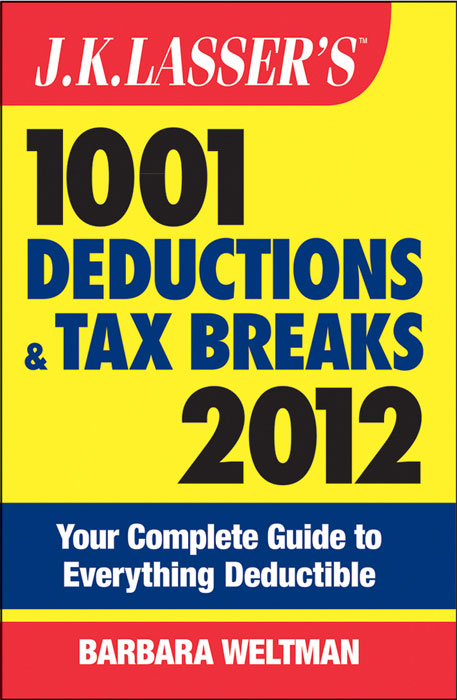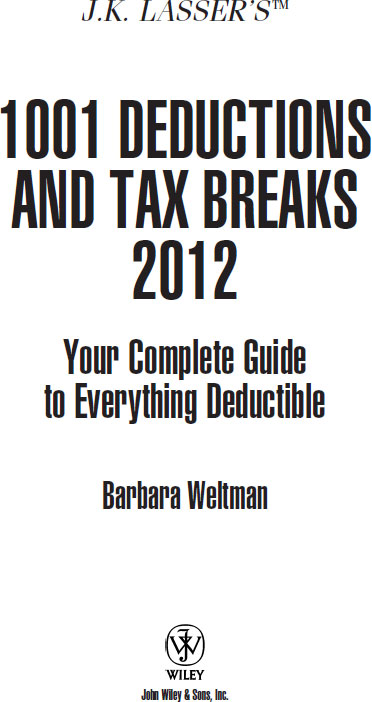Copyright 2012 by Barbara Weltman. All rights reserved.
Published by John Wiley & Sons, Inc., Hoboken, New Jersey.
Published simultaneously in Canada.
No part of this publication may be reproduced, stored in a retrieval system, or transmitted in any form or by any means, electronic, mechanical, photocopying, recording, scanning, or otherwise, except as permitted under Section 107 or 108 of the 1976 United States Copyright Act, without either the prior written permission of the Publisher, or authorization through payment of the appropriate per-copy fee to the Copyright Clearance Center, Inc., 222 Rosewood Drive, Danvers, MA 01923, (978) 750-8400, fax (978) 646-8600, or on the web at www.copyright.com . Requests to the Publisher for permission should be addressed to the Permissions Department, John Wiley & Sons, Inc., 111 River Street, Hoboken, NJ 07030, (201) 748-6011, fax (201) 748-6008, or online at http://www.wiley.com/go/permissions .
Limit of Liability/Disclaimer of Warranty: While the publisher and author have used their best efforts in preparing this book, they make no representations or warranties with respect to the accuracy or completeness of the contents of this book and specifically disclaim any implied warranties of merchantability or fitness for a particular purpose. No warranty may be created or extended by sales representatives or written sales materials. The advice and strategies contained herein may not be suitable for your situation. You should consult with a professional where appropriate. Neither the publisher nor author shall be liable for any loss of profit or any other commercial damages, including but not limited to special, incidental, consequential, or other damages.
For general information on our other products and services or for technical support, please contact our Customer Care Department within the United States at (800) 762-2974, outside the United States at (317) 572-3993 or fax (317) 572-4002.
Wiley also publishes its books in a variety of electronic formats. Some content that appears in print may not be available in electronic books.
For more information about Wiley products, visit our web site at www.wiley.com .
Designations used by companies to distinguish their products are often claimed by trademarks. In all instances where the author or publisher is aware of a claim, the product names appear in Initial Capital letters. Readers, however, should contact the appropriate companies for more complete information regarding trademarks and registration.
ISBN 978-1-118-07257-8; 9781118176474 (ebk); 9781118176481 (ebk); 9781118176498 (ebk)
Introduction
Say the word taxes and most people groan. There are good reasons for this response: First of all, the cost of paying your taxes annually can be a financial burden. You may feel taken to the cleaners every time you view your paycheck after withholding for federal income taxes (not to mention state income taxes as well as Social Security and Medicare taxes).
Second, the tax law is very complicated and changing all the time. The federal tax rules grew from 400 pages in 1913 to more than 80,000 in 2009; this doesn't count the massive changes made by health care reform and other legislation in 2010 and 2011. In the past 10 years, there have been 4,428 changes, which amounts to a change each day. Congress changes the tax law to a greater or lesser extent every single yearand this year is no exception! In addition, new court decisions and IRS rulings appear each day, providing guidance on how to interpret the law.
Third, you have to know what the tax rules are and can't claim ignorance to avoid taxes and penalties. Even if you use a tax professional or tax preparation software to prepare your return, you remain responsible for your taxes. The Tax Court has noted that using software is not an automatic excuse to avoid underpayment penalties.
How can you combat the feeling of dread when it comes to taxes? It helps to know that the tax law is peppered with many, many tax breaks to which you may be entitled. These breaks allow you to not report certain economic benefits you enjoy or to subtract certain expenses from your income or even directly from your tax bill. As the famous jurist Judge Learned Hand once stated (in the 1934 case of Helvering v. Gregory in the Court of Appeals for the Second Circuit):
Anyone may arrange his affairs so that his taxes shall be as low as possible; he is not bound to choose that pattern which best pays the treasury. There is not even a patriotic duty to increase one's taxes. Over and over again the Courts have said that there is nothing sinister in so arranging affairs as to keep taxes as low as possible. Everyone does it, rich and poor alike, and all do right it for nobody owes any public duty to pay more than the law demands.
So get your tax affairs in order and reduce what you pay each year to Uncle Sam!
In getting a handle on how to do this by taking advantage of every tax break you may be entitled to without running afoul of the Internal Revenue Service (IRS), there are some simple rules to keep in mind. They include:
- You must report all of your income unless a specific law allows you to exclude or exempt it (so that it is never taxed) or defer it (so that it is taxed at a later time).
- You can claim deductions only when and to the extent the law allows. Deductions are referred to as a matter of legislative grace; Congress doesn't have to create them and does so only for some purpose (for example, to encourage economic activity or to balance some perceived inequity in the tax law).
- Tax credits are worth more than tax deductions. A credit reduces your tax payment on a dollar-for-dollar basis; a $1,000 credit saves you $1,000 in taxes. A deduction is worth only as much as the top tax bracket you are in. Suppose you are in the 28 percent tax bracket, which means this is the highest rate you pay on at least some of your income. If you have a $1,000 deduction, it is worth $280 (28 percent of $1,000) because it saves you $280 in taxes you would otherwise have to pay.
- Even if your income is modest, you may have to file Form 1040 (the so-called long form), rather than a simplified return (Form 1040A or 1040EZ), in order to claim certain tax benefits.
- In a number of cases, different deduction rules apply to the alternative minimum tax (AMT), a shadow tax system that ensures you pay at least some tax if your regular income tax is lower than it would have been without certain deductions.
Whether you prepare your return by hand (as 18 percent of filers do), use computer software or an online solution (22 percent), or rely on a professional (60 percent), this book is designed to tell you how to get every tax edge you're entitled to. Knowing what to look out for will help you plan ahead and organize your activities in such a way that you'll share less of your hard-earned money with Uncle Sam.
Tax-Favored Items
There are five types of tax-advantaged items receiving preferential or favorable treatment under the tax law:
Tax-free income income you can receive without any current or future tax concerns. Tax-free income may be in the form of exclusions or exemptions from tax. In many cases, tax-free items do not even have to be reported in any way on your return.
Capital gains profits on the sale or exchange of property held for more than one year (long-term). Long-term capital gains are subject to lower tax rates than the rates on other income, such as salary and interest income, and may even be tax free in some cases. Ordinary dividends on stocks and capital gain distributions from stock mutual funds are taxed at the same low rates as long-term capital gains.


